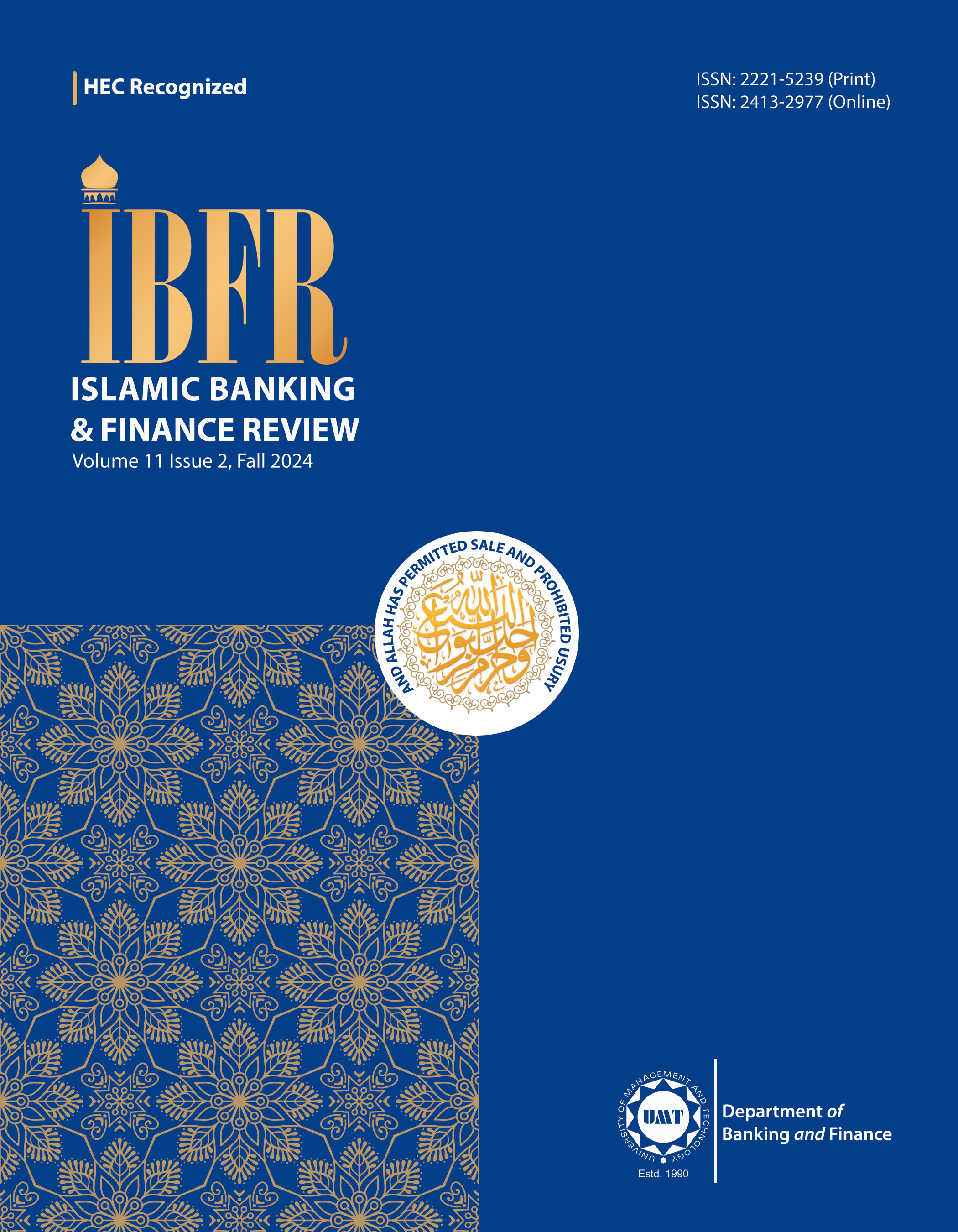Consequences of Earnings Management for Islamic Banks: Evidence from Worldwide, the GCC, and the ASEAN Region
Abstract
 Abstract Views: 0
Abstract Views: 0
This study aims to empirically investigate the impact of earnings management (EM) on the performance, stability, and managerial incentives of Islamic banks (IBs). Secondary data was obtained from 75 largest IBs (in terms of their total assets) worldwide from 2009 to 2020. The panel data estimation method was used to carry out the empirical analysis. Regression models were used for estimation on the worldwide sample, along with the samples from the GCC and ASEAN regions, respectively. The results showed the significant negative impact of EM on the internal performance (ROE/ROA) of IBs, both worldwide and in the GCC region. On the contrary, the findings indicated that EM does not exert a significant influence on the internal performance metrics of IBs within the ASEAN region. Additionally, no notable effects of EM on external performance, specifically in terms of stock returns, as well as on managerial incentives, were identified across all three sample sizes under investigation. Conversely, a significant negative relationship between EM and stability, as measured by the Z-score, was observed for all. This research is a pioneering empirical investigation into the effects of EM on the performance, stability, and risk-taking behavior of IBs, thereby providing a more nuanced understanding of its implications within the Islamic banking sector.
Downloads
References
Ab-Hamid, M. F., Asid, R., Sulaiman, N. F. C., Sulaiman, W. F. W., & Bahri, E. N. A. (2018). The effect of earnings management on bank efficiency. Asian Journal of Accounting and Governance, 10(3-4), 73–82. http://dx.doi.org/10.17576/AJAG-2018-10-07
Abdeljawad, I., Nour, A. I., Jalal, G., & Arda, A. (2022). Executive rewards and firm performance: A study from Palestine. In B. Alareeni & A. Hamdan (Eds.), Explore Business, technology opportunities and challenges after the Covid-19 pandemic (pp. 670–678). Springer.
Abdelmoneim, Z., & Yasser. M. (2023). The impact of bank performance and economic growth on bank profitability: Camel model application in middle-income countries. Banks and Banking Systems, 18(3), 204–220.
Adams, R., & Mehran, H. (2003). Is corporate governance different for bank holding companies? FRBNY Economic Policy Review, 9(1), 123–142.
Ahmad, G., Hayat, F., Almaqtari, F. A., Farhan, N. H., & Shahid, M. (2023). Corporate social responsibility spending and earnings management: The moderating effect of ownership structure. Journal of Cleaner Production, 384, Article e135556. https://doi.org/10.1016/j.jclepro.2022.135556
Alam, N., Ramachandran, J., & Nahomy, A. H. (2020). The impact of corporate governance and agency effect on earnings management–A test of the dual banking system. Research in International Business and Finance, 54, Article e101242. https://doi.org/10.1016/j.ribaf.2020.101242
Alhadab, M., & Al-Own, B. (2017). Earnings management and banks performance: Evidence from Europe. International Journal of Academic Research in Accounting, Finance and Management Sciences, 7(4), 134–145.
Al-Sharkas, A. A., & Al-Sharkas, T. A. (2022). The impact on bank profitability: Testing for capital adequacy ratio, cost-income ratio and non-performing loans in emerging markets. Journal of Governance & Regulation, 11(1), 231–243.
Aqabna, S. M., Aga, M., & Jabari, H. N. (2023). Firm performance, corporate social responsibility and the impact of earnings management during COVID-19: Evidence from MENA region. Sustainability, 15(2), Article e1485. https://doi.org/10.3390/su15021485
Azam, I., & Majeed, M. (2020). How islamic and conventional banks use discretionary loan loss provisions in Pakistan. Journal of Philosophy, Culture and Religion, 49, 14–19.
Bachtijeva, D. (2021). Assumptions, types of accounting manipulations and their application. Accounting Theory and Practice, 23, 1–15. https://doi.org/10.15388/batp.2021.33
Bennedsen, M., Kongsted, H. C., & Nielsen, K. M. (2004). Board size effects in closely held corporations (Working paper No. 9/2004). Copenhagen Business School.
Braima, B. H. G. E. (2021). Determinants of Islamic banks distress in gulf council countries (GCC). In M. Terzioğlu, G. Djurovic, & M. Bojaj (Eds.), Linear and non-linear financial econometrics-theory and practice. IntechOpen.
Brennan, N. M. (2021). Connecting earnings management to the real World: What happens in the black box of the boardroom? The British Accounting Review, 53(6), Article e101036. https://doi.org/10.1016/j.bar.2021.101036
Buanaputra, V. G. (2021). Is there any interaction between real earnings management and accrual-based earnings management? Indonesian Journal of Accounting and Auditing, 25(1), 12–23. https://doi.org/10.20885/jaai.vol25.iss1.art2
Cimini, R. (2015). How has the financial crisis affected earnings management? A European study. Applied Economics, 47(3), 302–317. https://doi.org/10.1080/00036846.2014.969828
Debnath, P. (2017). Assaying the impact of firm's growth and performance on earnings management: An empirical observation of Indian economy, International Journal of Research in Business Studies and Management, 4(2), 30–40. http://dx.doi.org/10.22259/ijrbsm.0402003
Dechow, P. M., Myers, L. A., & Shakespeare, C. (2010). Fair value accounting and gains from asset securitizations: A convenient earnings management tool with compensation side-benefits, Journal of Accounting and Economics, 49(1), 2–25. https://doi.org/10.1016/j.jacceco.2009.09.006
Ding, R., Li, J., & Wu, Z. (2018). Government affiliation, real earnings management, and firm performance: The case of privately held firms, Journal of Business Research, 83, 138–150. https://doi.org/10.1016/j.jbusres.2017.10.011
El Sood, H. A. (2012). Loan loss provisioning and income smoothing in US banks pre and post the financial crisis, International Review of Financial Analysis, 25, 64–72. https://doi.org/10.1016/j.irfa.2012.06.007
Fanta, A. (2013). Corporate governance and impact on bank performance. Journal of Finance and Accounting, 1(1), 19–26. https://doi.org/10.11648/j.jfa.20130101.12
Fitri, V., & Siswantoro, D. (2022). Can corporate governance mechanisms reduce earnings-management practices in Islamic banks? Journal of Islamic Accounting and Business Research, 13(1), 16–31. https://doi.org/10.1108/JIABR-04-2019-0081
Goulart, A. M. (2008). Management of accounting results in financial institutions in Brazil [Doctoral dissertation, University of São Paulo]. Digital Library USP. https://www.teses.usp.br/teses/disponiveis/12/12136/tde-17032008-124153/en.php
Grougiou, V., Leventis. S., Dedoulis. E., & Owusu-Ansah S. (2014). Corporate social responsibility and earnings management in U.S. banks. Accounting Forum, 38(3), 155–169. https://doi.org/10.1016/j.accfor.2014.05.003.
Haddawee, H. A., & Flayyih, H. H. (2020). The relationship between bank deposits and profitability for commercial banks. International Journal of Innovation, Creativity and Change, 13(7), 226–234.
Hamdi, F. M., & Zarai, M. A. (2013). Perspectives of earnings management in Islamic banking institutions. International Journal of Business and Management Invention, 2(9), 26–38.
Hatane, S. E., Octavia, F., & Florentina, J. (2018, 24–25). The comparison of earnings management practices in Indonesia’s Islamic banks and conventional banks [Paper presentation]. 3rd International Conference on Tourism, Economics, Accounting, Management, and Social Science. Bali, Indonesia.
Islamic Financial Service Board. (2020). Islamic financial services industry stability report 2020. https://www.ifsb.org/wp-content/uploads/2023/10/Islamic-Financial-Services-Industry-Stability-Report-2020_En.pdf
Islamic Development Bank Institute. (2021). Islamic development bank institute annual report 2021. https://www.isdb.org/sites/default/files/media/documents/2022-10/IsDBI_AR21_EN_WEB_LR_30.5.22.pdf
Jensen, M. C., & Meckling, W. H. (1976). Theory of the firm: Managerial behavior, agency cost and ownership structure. Journal of Financial Economics, 3, 305–360.
Khediri, K. B., Abidi, A., & Sayari, S. (2021). Profitability and stability of GCC Islamic banks: The role of corporate governance. The Journal of Asian Finance, Economics and Business, 8(6), 29–40.
Kanagaretnam, K., Lim, C. Y., & Lobo, G. J. (2010). Auditor reputation and earnings management: International evidence from the banking industry. Journal of Banking & Finance, 34(10), 2318–2327. https://doi.org/10.1016/j.jbankfin.2010.02.020
Kosmidou, P. Pasiouras, F., Doumpos, M., & Zopounidis, C. (2006). Assessing performance factors in the UK banking sector: A multicriteria methodology. Central European Journal of Operations Research, 14, 25–44. https://doi.org/10.1007/s10100-006-0158-5
Kosmidau, K., Tanna, S., & Pasiours, F. (2005, September 1–3). Determinants of profitability of domestic UK commercial banks: Panel evidence from the period of 1995-2002 [Paper presentation]. 37th Annual Conference of the Money, Macro and Finance Research Group. Rethymno, Crete.
Kliestik, T., Valaskova, K., Nica, E., Kovacova, M., & Lazaroiu, G. (2020). Advanced methods of earnings management: Monotonic trends and change-points under spotlight in the Visegrad countries. Oeconomia Copernicana, 11(2), 371–400.
Kumari, P., & Pattanayak, J. K. (2017). Linking earnings management practices and corporate governance system with the firms’ financial performance: A study of Indian commercial banks. Journal of Financial Crime, 24(2), 223–241. https://doi.org/10.1108/JFC-03-2016-0020
Lassoued, N., Attia, M. B. R., & Sassi, H. (2018). Earnings management in Islamic and conventional banks: Does ownership structure matter? Evidence from the MENA region. Journal of International Accounting, Auditing and Taxation, 30, 85–105. https://doi.org/10.1016/j.intaccaudtax.2017.12.003
Mersni, H., & Othman, H. B. (2016). The impact of corporate governance mechanisms on earnings management in Islamic banks in the Middle East Region. Journal of Islamic Accounting and Business Research, 7(4), 318–348. https://doi.org/10.1108/JIABR-11-2014-0039
Mojoodiniay, K. S., & Tasaddi, K. M. J. (2023). The relationship between earnings management and firm performance in the companies listed in Tehran stock exchange: The function of firm size. Environmental Energy and Economic Research, 7(1), 1–10. https://doi.org/10.22097/eeer.2022.362492.1264
Montgomery, L. (1998). Recent developments affecting depository institutions. FDIC Banking Review, 11(4), 26–34.
Nurianah, N. (2019). What is earning management in sharia bank lower than conventional bank? Journal of Islamic Accounting and Finance Research, 1(1), 97–118. https://doi.org/10.21580/jiafr.2019.1.1.3730
Othman, H. B., & Mersni, H. (2014). The use of discretionary loan loss provisions by Islamic banks and conventional banks in the Middle East region: A comparative study. Studies in Economics and Finance, 31(1), 106–128. https://doi.org/10.1108/SEF-02-2013-0017
Proença, P., C., Augusto, M., & Murteira, J. (2023). The effect of earnings management on bank efficiency: Evidence from ECB-supervised banks. Finance Research Letters, 51, Article e103450. https://doi.org/10.1016/j.frl.2022.103450
Puri-Mirza, A. (2023, January 18). Islamic banking assets globally 2018-2020, by region. Statista. https://www.statista.com/statistics/1264618/islamic-banking-assets-region/
Quttainah, M. A., Song, L., & Wu, Q. (2013). Do Islamic banks employ less earning management? Journal of International Financial Management & Accounting, 24(3), 203–233. https://doi.org/10.1111/jifm.12011
Redmond, G., & Bohnsack, C. L. (2007). Bank size and profitability: One nation, one bank? International Journal of Business Research, 7(1), 162–169
Riahi, Y. (2020). Examining the relationship between bank stability and earnings quality in Islamic and conventional banks. International Journal of Islamic and Middle Eastern Finance and Management, 13(5), 803–826. https://doi.org/10.1108/IMEFM-10-2018-0328
Salem, R., Usman, M., & Ezeani, E. (2021). Loan loss provisions and audit quality: Evidence from MENA Islamic and conventional banks. The Quarterly Review of Economics and Finance, 79, 345–359. https://doi.org/10.1016/j.qref.2020.07.002
Setiawati, A. S., & Witono, B. (2023). Analysis of CSR disclosure, earnings persistency, earnings growth, and business size on earnings management with institutional ownership as a moderating variable (Case study on LQ45 companies listed on the Indonesia stock exchange (IDX) 2016-2020). Riset Akuntansidan Keuangan Indonesia, 7(2), 227–243.
Sufian, F., & Chong, R. R. (2008). Determinants of bank profitability in a developing economy: Empirical evidence from the Philippines. Asian Academy of Management Journal of Accounting & Finance, 4(2), 91–112.
Sufian, F., & Habibullah, M. S. (2009). Bank specific and macroeconomic determinants of
bank profitability: Empirical evidence from the China banking sector. Frontiers
of Economics in China, 4(2), 274–291.
Syarif, F., Qorib, A., Siregar, S., & Muda, I. (2021). Factors affecting earnings management islamic banking companies at the Indonesia stock exchange publication year 2013-2019. Jurnal Ilmiah Akuntansi, 6(2), 491–515.
Tan, Y., & Floros, C. (2012). Bank profitability and inflation: The case of China. Journal of Economic studies, 39(6), 675–696. https://doi.org/10.1108/01443581211274610
Ujah, N. U., Brusa, J., & Okafor, C. E. (2017). The influence of earnings management and bank structure on bank performance: International evidence. Managerial Finance, 43(7), 761–773. https://doi.org/10.1108/MF-12-2015-0329
Verrecchia, R. E. (1983). Discretionary disclosure. Journal of Accounting and Economics, 5, 179–194. https://doi.org/10.1016/0165-4101(83)90011-3
Zainuldin, M. H., & Lui, T. K. (2020). Earnings management in financial institutions: A comparative study of Islamic banks and conventional banks in emerging markets. Pacific-Basin Finance Journal, 62, Article e101044. https://doi.org/10.1016/j.pacfin.2018.07.005
Copyright (c) 2024 Dr. Qazi Yasir Arafat

This work is licensed under a Creative Commons Attribution 4.0 International License.
Authors retain copyright and grant the journal right of first publication with the work simultaneously licensed under a Creative Commons Attribution (CC-BY) 4.0 License that allows others to share the work with an acknowledgement of the work’s authorship and initial publication in this journal.












